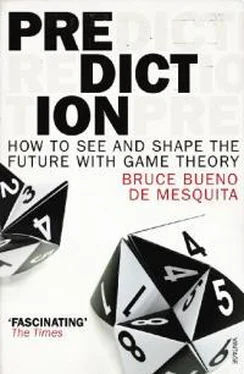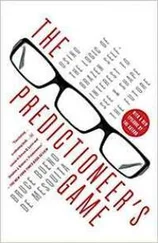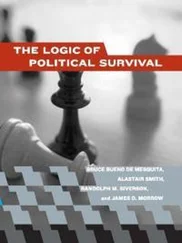As valuable as area studies is, it is by itself a poor substitute for the marriage of expertise about places and the expertise of applied game theorists about how people decide. Yet we seem to think that knowing the facts is sufficient. Some even contend that it is ridiculous to rely on something as abstract as mathematics to anticipate what people will do. Speaking of ridiculous things, we surely would think it ridiculous if chemists believed that oxygen and hydrogen combine differently in China than they do in the United States, but for some reason we think it entirely sensible to believe that people make choices based on different principles in Timbuktu than in Tipperary (we might be different from mere particles, but we’re not all that different from one another). Country expertise is no substitute for understanding the principles that govern human decision making, and it should be subordinate to them, working in tandem to provide nuance as we actively seek to engineer a better future.
To explore how this view informs the predictioneering process, in this chapter we’ll turn to a group that lives and feeds on human conflict: lawyers. Lawyers share with diplomats, academics, and business leaders a conviction that country names matter, but—let’s give them some credit—they believe this for better reasons. Different countries have adopted different rules of law. Some assume innocence until guilt is proven, while others assume the opposite; some make the loser pay the costs of litigation, while others do not. But that difference aside, lawyers, like diplomats and statesmen, spend much of their time negotiating the resolution of disputes—and almost none of them ever learn any game theory or study negotiation strategies. Lawyers study law, and diplomats study countries. Both groups may read popular books from which they get some useful insights, but collections of clever anecdotes and off-the-shelf recipes for success are no substitute for the serious study of game theory or for getting the assistance of people with expertise on how decisions are made.
When diplomacy is successful, wars are fought with words, the combatants sitting around a table, drinking Perrier until a resolution is reached and celebrated with fine wine. Lawsuits are wars too. Just as most international disputes are settled long before they get to the battlefield, so are lawsuits played out in meeting rooms, boardrooms, lawyers’ offices, and only rarely courtrooms. Lawyers prepare arguments, investigate precedents, amass documents, and study the other side’s paper trail. In big corporate suits, millions, even tens of millions of dollars are spent on armies of attorneys. I’ve worked on lawsuits involving so many lawyers and so many law firms that it was almost impossible to keep track of them. My consulting company has frequently advised on lawsuits in which the defendant—usually our client is a defendant—holds uncountable meetings with one or two dozen lawyers at each meeting, all senior partners in major law firms, each one billing $400, $500, $600, $700, or more per hour. A typical meeting running just one workday with a dozen lawyers in attendance costs about $57,600—and that doesn’t include the vastly higher costs of preparation for that day’s discussion. Multiply that by dozens of meetings, and then two or three times more to reflect the costs of preparation, and you begin to see how quickly lawsuits become phenomenally expensive. I’ve advised on cases where my client spent tens of millions more on lawyers than they paid in settlement.
Of course, all that lawyer money is not spent without some reason. It’s generally spent for two purposes. First, the money is buying preparation to improve the prospects of victory. That is, of course, the lawyers’ job. Second, the money is spent to signal the other side that they are up against deep pockets that can endure high costs to fight the good fight. The message: “We will keep you embattled in motions, countermotions, and delays until we break the bank. We can spend more than you.” Naturally, the other side is spending tons of money with the same two purposes in mind. The two sides are playing the game called the war of attrition. 1It’s great for lawyers, and awful for everyone else.
Armies are the diplomat’s analog to the prodigious spending on lawsuits. Having more and bigger guns discourages others from picking fights with the well-armed. Deterrence works much of the time, but sometimes, just as with the deterrent threat of costly litigation, arms fail to protect the peace—and war results. Wars and litigation are inefficient ways to resolve problems. They almost never end in a decisive victory. Instead, they usually end in a negotiated settlement. Both sides find a deal they could, in principle, have arrived at without all the costs that finally brought them to the negotiating table. 2
One reason that diplomats and attorneys do not avoid the huge costs of their pre-settlement minuets is that they simply don’t know bargaining theory. They’re reduced to working out the complexities of each situation on their own. Seat-of-the-pants wisdom and experience help, and some lawyers and diplomats are quite good at it, but for most, an awful lot gets overlooked, delaying settlement and rendering the resolution of disputes more costly than it needs to be.
In the dance that precedes negotiations, attorneys and diplomats tend to center their arguments on the merits of the case. Rarely do they really think through the motivations and incentives of their opponents, the people they represent, and themselves. After they form an opinion about the strengths and weaknesses of their case—which is what lawyers are trained to do—they try to impose some reality check on what their clients think, whether the clients are plaintiffs who think themselves terribly harmed or defendants who think themselves exploited. The positions the defendants (or plaintiffs) discuss among themselves in terms of money or other factors in a lawsuit reflect their judgment about the merits of the case. They know this is true for the other side as well. It is no different with international negotiations, whether they concern land for peace, the abandonment of nuclear weapons, or basic principles of governance and human rights.
When my firm advises on a lawsuit, we are always asked how much of the documentation we want to read. Presumably the attorneys hope to give us a reality check, just as they have done for their clients and with themselves. Usually the documentation we are given the opportunity to read is prodigious. There are stacks and stacks of paper. Fortunately, our answer reliably is that we really do not need to read the documents. The merits of the case don’t matter very much once negotiations begin— the merits are inherent in the impasse .
How can this be? Remember the information we seek in expert interviews. None of it is about how meritorious anyone’s position is. It’s all about calculating how much they care about the result and ferreting out how much they care about getting personal credit. Business managers often care a lot about the result; lawyers often care a lot about credit that results in getting more business and building their reputations for the next suit.
In the last chapter I introduced one issue that was part of a more complex web of problems confronting a large firm embroiled in litigation with the U.S. Department of Justice. Here was the table I used to reference the scale of outcomes:
Scale Position
Meaning
100
Multiple felony charges including several specific, severe felonies
90
Several specific, severe felony counts but no lesser felonies
80
One count of the severe felony plus several lesser felonies
75
One count of the severe felony but no other felonies
Читать дальше











